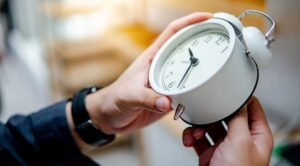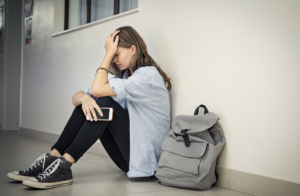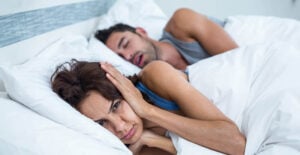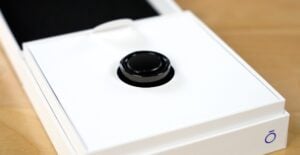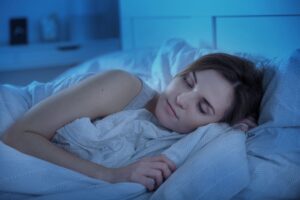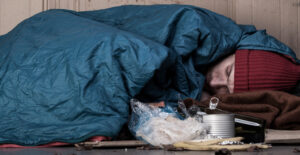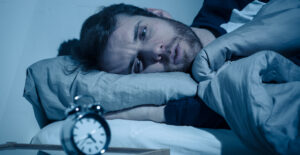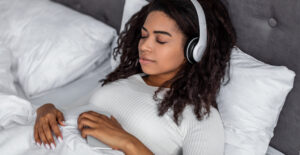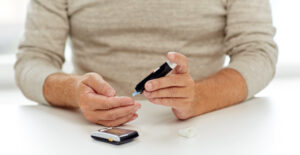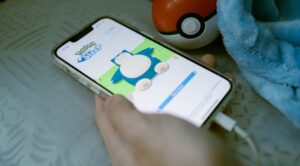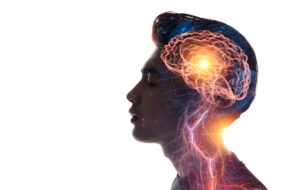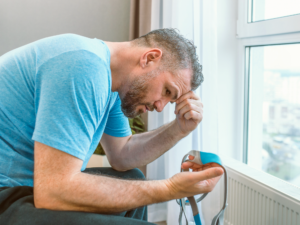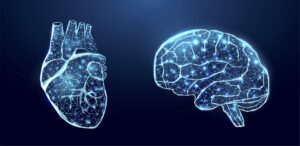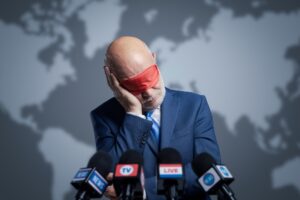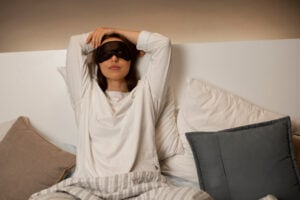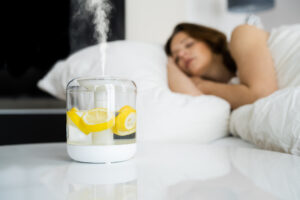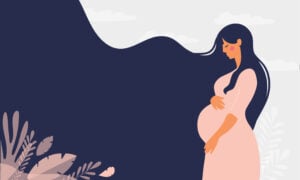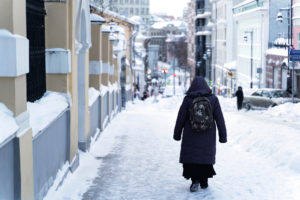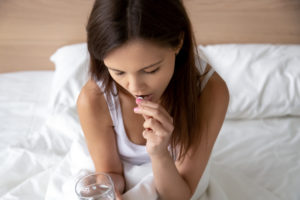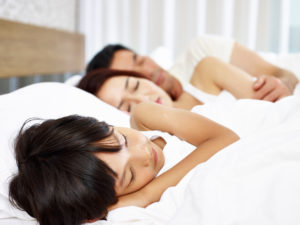46% of People with Below-Average Sleep Quality Rate Their Mental Health As Poor
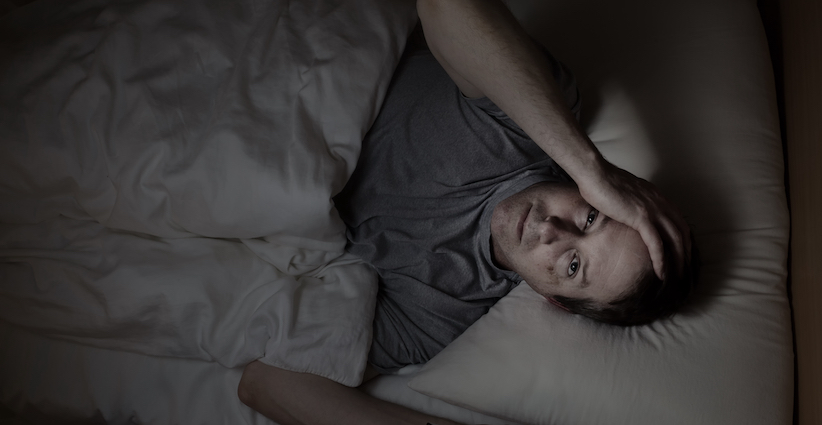
- 46% of people with below-average sleep quality rated their mental health as poor or very poor and were three times as likely to rate it as such over those with average or above-average mental health.
- People who said their mental health was poor or very poor (25%) slept nearly an hour less (6.3 hours vs. 7.2 hours) than those with above-average mental health (41%).
- People with anxiety and depression are twice as likely to experience mood changes due to sleep deprivation.
- People under 44 were more likely to identify mental health as the leading cause of their sleeping problems (30% vs. 18% of people over 45). But on average, people over 45 slept about 20 minutes less and were more likely to rate their sleep quality as below average.
In a TikTok video, 37-year-old content creator Julie Story lies in bed, ready to fall asleep. Suddenly, a character labeled “My Anxiety” (played by herself), pops onto the scene with an impish grin. “I just want to go over every social interaction you’ve had in the last 10 years,” she chirps. Story begs to sleep, but her anxiety says, “I just really can’t let you do that.”
The video clearly struck a chord with Story’s followers: hundreds of them left comments sharing that they relate to her struggles. “I hadn’t even heard about anybody else really struggling with sleep anxiety,” she says. “It was so nice to not feel so alone.”
While posts like these may be cathartic for those who struggle with anxiety at night, they speak to a serious issue. There’s a strong connection between mental health and sleep, which was reflected in findings of an April 2024 survey of 1,000 U.S. adults by Sleepfoundation.org.
“I hadn’t even heard about anybody else really struggling with sleep anxiety,” she says. “It was so nice to not feel so alone.” – Content Creator Julie Story
The survey found that those who describe their mental health as below average sleep less, and when they do slumber, the quality of their sleep is worse. Those in this group sleep for nearly an hour less per night than those with above-average mental health (6.3 hours vs. 7.2 hours). They are also three times as likely to rate their sleep quality as poor or very poor.
“Anxiety is like dumping gasoline on the fire of insomnia,” says Dr. Brandon Peters, a neurologist and sleep medicine specialist who wrote the book “Sleep Through Insomnia” about cognitive behavioral therapy for insomnia (CBT-I). “People who sleep well do not think about their sleep. People with insomnia often have a lot of negative thinking that develops around their sleep.”
Jeanne Chang, a 43-year-old marketing director and mother of two in San Francisco, has dealt with insomnia her entire life and believes anxiety is the root of her issues.
“Typically, I’ll go to bed feeling dead tired, barely able to keep my eyes open,” she says. “I can’t wait to sleep, but then my brain won’t shut off. Instead, I lie in bed for so long that I lose track of time. Has it been an hour or three? Did I manage to fall asleep at all?”
A number of other mental health conditions are linked to sleep troubles as well, notes Dr. Peters. Depression can be associated with too little or too much sleep; manic episodes in bipolar disorder may be associated with reduced sleep; untreated sleep disorders such as sleep apnea can lead to anxiety and depression; and sleep deprivation can aggravate various other psychiatric problems.

A Vicious Cycle: Sleep Begets Emotional Wellness, Emotional Wellness Begets Sleep
Mental health issues don’t merely cause worse sleep – the relationship works both ways. People can get caught up in a negative feedback loop wherein they’re too anxious (or depressed or stressed) to sleep, then too tired to manage their anxiety (or depression, stress).
Nearly half of people who report having below-average sleep quality rate their mental health as below average (poor or very poor). That number drops to 22% for people with average sleep quality, and only 11% for people with above-average sleep quality.
“It’s a relentless cycle,” says Chang. “The stress and anxiety from having too much to do lead to insomnia, which leaves me too tired to get everything done. When exhaustion sets in, I struggle to be the parent I want to be. I notice myself becoming withdrawn and impatient with my kids. Then the mom guilt leads to more anxiety and the cycle continues.”
The survey findings echo Chang’s experience, showing that people with below-average sleep quality are up to two times more likely to regularly experience nervousness/agitation than those with above-average sleep quality (59% vs. 29%). They are also more likely to experience irritability (59% vs. 29%), loneliness (45% vs. 26%), and worry/apprehension (58% vs. 32%). In contrast, a person with even average sleep quality is notably less likely to regularly experience these symptoms.
“Sleep and mood walk hand in hand,” says Dr. Peters. “Research suggests that when both a mood disorder and sleep problem are present, effort should be made to improve sleep, as it benefits both.”
Anxiety and Depression Make It Harder To Cope with Sleep Deprivation
Ample research has shown that sleep deprivation is associated with greater anxiety, but the SleepFoundation.org survey revealed a new layer to this dynamic: people with anxiety and depression appear to more intensely experience the consequences of one or more nights of bad sleep. In other words, they might snooze for the same amount of time as another person, but feel worse the next day.
This may be due to the fact that sleep quality is more than a matter of the number of hours clocked. Our bodies typically cycle through several sleep cycles in a night, and within each cycle are four individual stages of sleep, each of which plays an important role in ensuring our minds and bodies function well. During the first two stages, we have relatively light sleep, followed by a phase of deep sleep and finally, REM sleep, which is when we dream. REM sleep is essential to brain functions such as memory, learning and creativity, so if someone is constantly waking at night due to anxiety or another mental condition, their sleep quality will suffer. “Awakenings, which may be normal and may have been previously ignored, become problematic when they evoke the stress response,” says Dr. Peters. “Anxiety, frustration, anger – none of these are conducive to sleep. The electrical activity of the brain may change, leading to higher frequency patterns that undermine sleep depth, continuity, and quality. This can happen with frequent arousals, moving from deep to light sleep, or awakenings, when the person comes fully to consciousness. This may cause fragmentation of sleep and undermine the perceived sleep quality,” he says.
Compared to people who have not been diagnosed with any mental health condition, individuals with a diagnosis are much more likely to experience symptoms of sleep deprivation such as mood changes (62% vs 32%), irritability (58% vs. 32%), lack of motivation (67% vs. 37%), lower sex drive (26% vs. 9%), and memory lapses/loss of focus (40% vs. 18%). While 18% of people with no diagnosed mental health conditions say they have no symptoms after sleeping poorly, a mere 4% of people with anxiety or depression say the same.
Major Stressors Contribute to Declines in Mental Health and Sleep
Traumatic life events take a measurable toll on people’s mental health and sleep. Compared to people with no major life stressors, those going through divorce, or the death or illness of a loved one, sleep 28-minutes less per night on average. They are more than four times more likely to say that their mental health affects their sleep every night (31% vs. 7%).
When it comes to stress, more is more. Going through multiple emotionally taxing changes can have a compounding effect. Experiencing three or more stressors is associated with a significant decrease in subjective ratings of both mental health and sleep quality. Compared to people with two or fewer stressors, those with three or more stressors are three times more likely to rate mental health as very poor (13% vs. 4%). Unsurprisingly, their sleep takes a hit as well. They are nearly two times more likely to have below average sleep quality (41% vs. 22%).
Younger People are More Likely to Blame Their Sleep Issues On Mental Health
Anxiety and insomnia can strike at any age, but younger people may be more quick to attribute their issues to issues such as anxiety and depression. That’s not because they have a harder time sleeping. On average, those over 45 sleep about 20 minutes less and are more likely to rate their sleep quality as below average. Yet people younger than 44 are much more likely to identify mental health as the leading cause of their sleeping problems: 30% of them blame mental health, compared to 18% of people over 45.
This difference may reflect broader trends in the U.S. regarding mental health, which has become more openly acknowledged in the past several decades. One study looking at whether mental illness has been destigmatized in the U.S. concluded that between 2006 and 2018, there occurred a significant decrease in stigma around major depression. People have also become more literate about mental health in general.
How to Cope with Anxiety-Related Sleep Issues
Troubleshooting sleep issues can be complex, since there are so many contributing factors. However, there are some tips that relate to anxiety in particular. Dr. Peters recommends seeking out CBT-I, noting that it can be very helpful to improve insomnia worsened by anxiety. You can also ask your doctor about getting a sleep study, where they will monitor you while you sleep to help identify potential issues.
Your doctor may also prescribe medication or supplements. Story says her physician recommended she take magnesium for better sleep and it’s been a huge help to her. (It’s worth noting, however, that compared to people who never take sleep meds, people who take them once a month or more were more likely to have trouble falling asleep and wake up at night without being able to fall back asleep – but this may also be the result of having underlying sleep issues that they’re taking sleep aids for in the first place.)
Chang says that what seems to work best for her is getting to bed before she’s overly tired, and limiting her caffeine intake to two cups of coffee before noon. She does her best to get tasks done that are causing her stress, but acknowledges that it’s rarely possible to cross everything off her list. What she can do is at least get any lingering concerns down on paper.
“A notebook on the nightstand to jot down thoughts helps a lot,” she says.
Sometimes, despite your best efforts, you just can’t fall asleep or get the recommended seven hours of sleep in a given night. When that happens, take comfort in the fact that there are still ways to let your body restore and repair itself. Some swear by the relaxation technique non-sleep deep rest (NSDR), which allows the body to go into a state of deep relaxation that is similar to sleeping.
Story has her go-tos too: When she’s having an extra anxious week, she’ll listen to an audiobook or ASMR in bed.
When all else fails, try not to be too hard on yourself. After all, tomorrow is always a new day for a fresh start.
Methodology
The survey commissioned by SleepFoundation.org was conducted on the online survey platform Pollfish in April 2024. Results are from 1,000 survey participants in the United States who were ages 18 and older at the time of the survey. All respondents attested to answering the survey questions truthfully and accurately.
Got a hot tip? Pitch us your story idea, share your expertise with SleepFoundation.org, or let us know about your sleep experiences right here.
References
2 Sources
-
American Psychological Association. (2023, December 21). Sleep deprivation makes us less happy, more anxious [Press release].
https://www.apa.org/news/press/releases/2023/12/sleep-deprivation-anxious -
Pescosolido BA, Halpern-Manners A, Luo L, Perry B. Trends in Public Stigma of Mental Illness in the US, 1996-2018. JAMA Netw Open. 2021 Dec 1;4(12):e2140202. doi: 10.1001/jamanetworkopen.2021.40202. PMID: 34932103; PMCID: PMC8693212
https://pubmed.ncbi.nlm.nih.gov/34932103/


